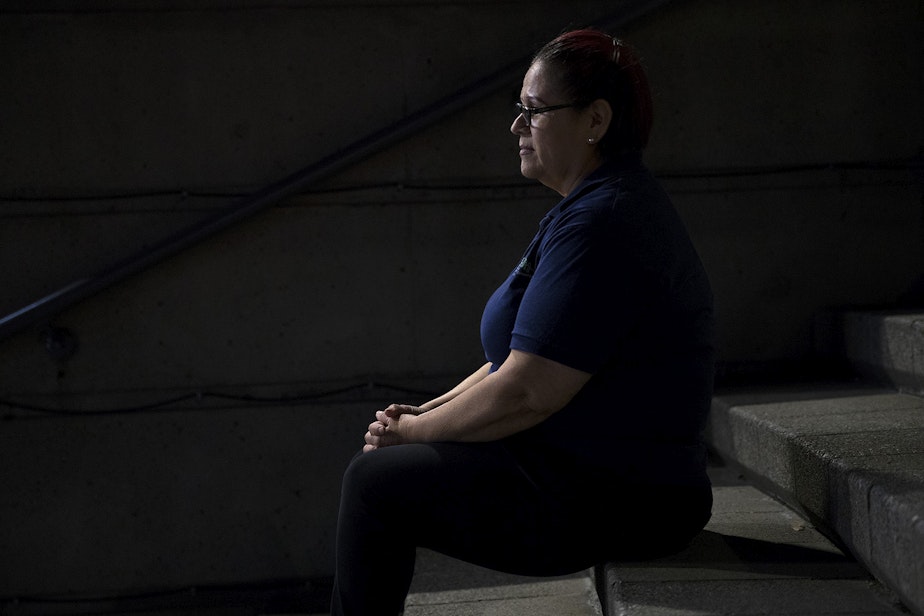'Who run the world?' At night, Seattle's immigrant women

F
atima had sewn up her dress one inch so that she could vacuum on the floors of a downtown Seattle high rise.
Fatima did not want to work as a janitor. She wanted to run a child daycare.
But when she immigrated to the U.S. from Ethiopia, she found herself struggling to find a decent paying job. She had a high school diploma, and her English was good, but she felt that it was not good enough.
She also had seven kids. And as a single mom, she wanted to be there during the day.
“I have to take care of my kids, too. Take them to school, prepare food, and everything,” Fatima said. (Fatima is not her real name.)
So she took a night shift position at a Seattle cleaning company. The work is hard on her body. She said her back hurts because of the backpack vacuum cleaner. It’s a 10-pound piece of equipment, but as it picks up dust and trash, it keeps getting heavier.
Sponsored
Researchers at the Washington State Department of Labor and Industries say janitorial workers have some of the highest injury rates across the board -- even compared to jobs like construction or farmwork.
[Read the rest of the Night Shift series.]
According to research from 2017, women make up about a third of the janitorial workforce in Washington State. But they had about twice the rate of injury.
Caroline Smith is one of the researchers who worked on that study. She said they’re still not quite sure why women bear the brunt of the injuries.
“Equipment hasn’t changed in the last few decades, but the people who do the work has,” Smith said.
Sponsored
The equipment is often not made for women. Because the work is repetitive, workers are likely to develop carpal tunnel, arthritis, and slipped discs.
Sponsored
Immigrants make up a large portion of the overnight workforce. Immigrant women, specifically, are 24% more likely to work odd shift hours, even at higher skilled jobs.
Sponsored
And while the immigrant experience is not a monolith, those that work in the service sector are usually also low-income and speak English as a second language.
A
t 11:30 p.m. on a Sunday night, Sofia trudges into the WinCo in Renton. She’s a short Mexican woman with glasses. She’s dressed in her navy blue work shirt, hair up in a neat bun. She said sometimes people will stare, their eyes looking her up and down.
Se nota que te miran, te asen fuchi.
Sponsored
“You can tell they’re looking at you like, 'ugh,'” she said in Spanish, wrinkling her nose, mimicking their reactions. (Sofia is not her real name.)
Still, she has to go grocery shopping, and Sunday is the only night she can make it. On those days, she starts work at 2 p.m. and gets out by 10 p.m.
Sofia squeezes a green avocado, then glances at the price. $1.50 each. “Que caro!” How expensive, she said, and puts it back.
Sofia has worked the night shift as a janitor for five years. She’s in her late fifties, though, and the work is wearing on her. As she picks up a tomato, she explains that she has to massage her hands so they don’t cramp up after a long shift.
Last year, she spent a month out of work. A disc in her back slipped and left her immobilized. She ended up in the hospital, and the doctor put her on bed rest.
Sponsored
She said the worst was the waiting. After two weeks of bed rest, she fell behind on her credit card and bills.
Empezaron las llamadas todos los días, a todas horas.
She said she got calls from the bank every day, at all hours. Her husband works as a mechanic, but it wasn’t enough to make ends meet. Sofia has three adult children and eight grandkids.
By week three on bedrest, she started having panic attacks, thinking about her growing debt.
Sofia went back to the doctor and asked to be cleared to return to work. The doctor asked her to take on lighter duties. But Sofia’s workplace didn’t have light duty work for her. They asked her to come back when she was fully recuperated.
She couldn’t wait that long, though, so the doctor finally obliged. She went back, still recovering from her back injury.
Sponsored

F
or Fatima, the issue at work was harassment.
It started last year, with hugs and stares from her boss. She asked him to stop, but then he started to follow her. She hid in the women’s bathroom or worked on another floor to avoid him.
“He tried to force me to touch him, he tried to force me to hug him,” she said. “Pulling his hand and touch…”
She motions to her chest and doesn’t finish the sentence.
“When he go, I cry. My eyes become red, I try to hide from everyone because I don’t want everyone to see my eyes,” she said.
When it comes to sexual harassment, Smith said workers are often embarrassed, and sometimes normalize or minimize the severity of the situation.
“If I say something, maybe I lose my job,” Fatima said.
Eventually she confided in her daughter, who reached out to the union that represents janitorial workers, and Fatima filed a complaint. That supervisor was eventually fired when it was discovered he’d also been harassing another employee.
S
ofia and Fatima’s stories are not unusual. Both shared stories of coworkers who struggled with injury and harassment, too.
Sleep is another issue, as is waiting for the bus after work at 3 a.m. They know there is no sleeping in at the end of the route: For these women, when the night shift job ends, the day shift at home begins.
And so they keep going. They’re part of Seattle’s quiet night economy — keeping the wheels of the city running, one building at a time.

